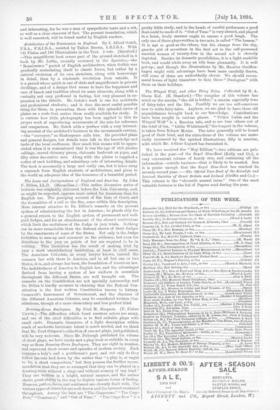Drawing-Room Duologues. By Fred M. Simpson. (T. Fisher Unwin.)—The difficulties
which beset amateur actors are many, and one of the chief difficulties is to find suitable plays with small casts. Dramatic literature of a light description within reach of moderate histrionic talent is much needed, and we think that Mr. Fred Simpson's collection of one-act plays, just published, will be very welcome. Since Mr. Duburgh published his volume of short plays, we have rarely met a play-book so suitable in every way as these Drawing-Room Duologues. They are eight in number, and represent short scenes and episodes of modern society. Each contains a lady's and it gentleman's part, and not only do they follow the rule laid down by the author that "a play is, or ought to be, a short composition," but they possess the further recom- mendation that they are so arranged that they can be played in a drawing-room without a stage and without scenery of any kind." They are written in a bright, natural manner, and the author shows great ability in the way he depicts various forma of feeling. Humour, pathos, farce, and sentiment are cleverly dealt with. The various types of character are well drawn and the interest sustained throughout. Among the best are "The Chaperone," "The Crape Bow," "Constancy," and "Out of Tune." "The Crape Bow" is a
pretty little study, and in the hands of careful performers a good deal could be made of it. "Out of Tune" is very absurd, and played in a brisk, lively manner ought to ensure a good laugh. The only one of these playswritten in two acts, is called "The Leeson." It is net so good as the others, but the change from the shy, gauche girl of seventeen in the first act to the self-possessed married woman of twenty-four in the second act is cleverly depicted. Besides its dramatic possibilities, it is a light readable book, and would while away an idle hour pleasantly. It is well got-up ; and though the illustrations by Mr. Maurice Greiffen- began might with advantage have been more carefully drawn, still some of them are undoubtedly clever. We should recom- mend lovers of light literature to take these " Duologues " with them on their holidays.


































 Previous page
Previous page